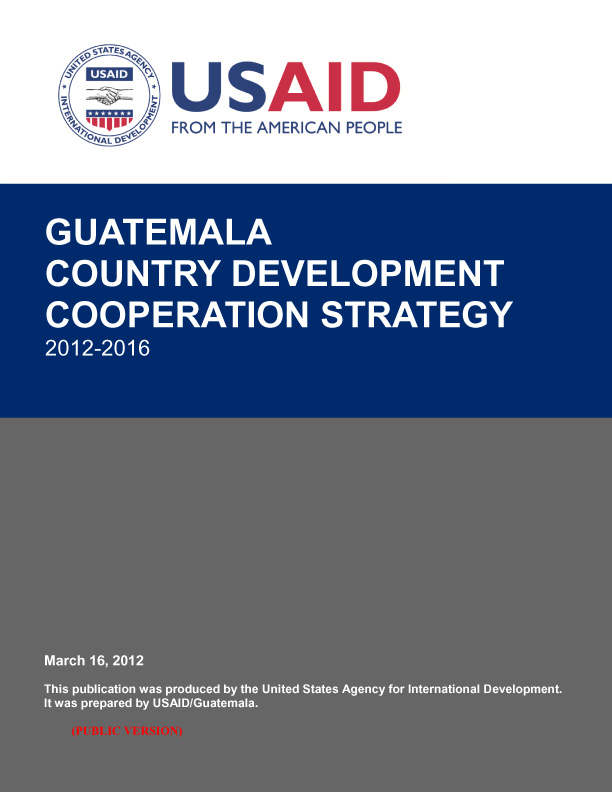The CDCS is a five-year plan based on a strategically-targeted approach to address the complex and interrelated development challenges facing Guatemalan society.
Guatemala - Country Development Cooperation Strategy ![]() (pdf - 1 MB)
(pdf - 1 MB)
The USAID Guatemala CDCS supports U.S. foreign policy goals as stated in the first pillar of the U.S. Global Development Policy, in the form of sustainable development outcomes that place a premium on broad-based economic growth, human development, democratic governance, game-changing innovations, and sustainable systems for meeting human needs. The CDCS is a five-year plan based on a strategically-targeted approach to address the complex and interrelated development challenges facing Guatemalan society. The CDCS is characterized by a highly integrated, multi-sector portfolio that aims to achieve one Goal and three Development Objectives as follows.
Goal: A More Secure Guatemala that Fosters Greater Socio-economic Development in the Western Highlands and Sustainably Manages its Natural Resources
Development Objective One: Greater Security and Justice for Citizens. In order to create a more democratic, secure and prosperous Guatemala, GOG state institutions must have technical proficiency, political will, long-term strategies and an adequate budget to deliver security and justice to its citizens. Security is a basic human need which, when lacking, inhibits development in other sectors. DO 1 hypothesizes that increasing the demand for police and justice reform, strengthening national level government capacities to include administrative, financial and strategic planning, institutionalizing crime prevention strategies, targeting pilot projects in key areas with high homicide rates, strengthening local governments, and improving transparency and accountability of key institutions will lead to a reduction in crime and an increase in the number of prosecutions with final verdicts, thus breaking the vicious cycle of impunity. This DO complements work carried out by other USG agencies, some of which is funded by CARSI. The approach is also aligned with the USG Central America Strategy and the Counter Illicit Trafficking Strategy.
Development Objective Two: Improved Levels of Economic Growth and Social Development in the Western Highlands. Improved economic growth and social development are essential to a stable democracy and are the basis of a secure and prosperous society. DO 2 hypothesizes that parallel improvements in the income, health and nutrition, and education of Guatemala‘s rural poor will foster the sustainable rural development necessary for social and economic equity. Improved income alone is insufficient to reduce poverty, illness and malnutrition in Guatemala‘s rural poor communities; therefore, USAID will work with the GOG in the Western Highlands to improve economic opportunities and the access and utilization of quality health, nutrition, and education services. DO 2 integrates Feed the Future and the Global Health Initiative Plus to achieve a high-order objective.
Development Objective 3: Improved Management of Natural Resources to Mitigate Impacts of Global Climate Change. Guatemala possesses a wealth of natural resources that, if managed responsibly, can bring economic benefits to local communities and to the country as a whole. At the same time, however, Guatemala is highly vulnerable to natural disasters and USAID Guatemala assumes that at least one natural disaster may interrupt the country‘s development trajectory during the CDCS period. DO 3 hypothesizes that community-based economic incentives for conservation and protection of biodiversity, coupled with improved enforcement of existing environmental regulations and improved national policies, will safeguard the resource base necessary for sustainable rural development and thus contribute to Guatemala‘s increased prosperity. Concurrent reduction of vulnerability to natural disasters will help mitigate loss of life and livelihoods due to climate change related events. Operating within the framework of the Global Climate Change Initiative, USAID will work with local communities and institutions to implement market-based strategies for the sustainable use of forest products and support local level risk mitigation. Concurrently, USAID will work with the GOG to promote and implement sustainable land use strategies, environmental management policies, and enforcement of regulations to improve environmental governance.









Comment
Make a general inquiry or suggest an improvement.